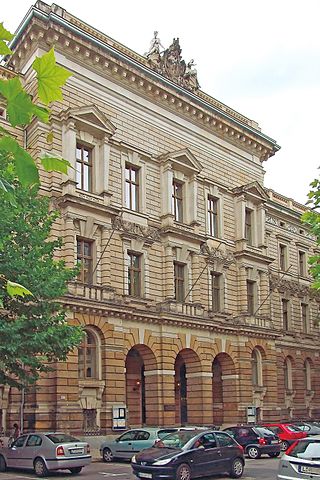Related Research Articles

The University of Music and Theatre "Felix Mendelssohn Bartholdy" Leipzig is a public university in Leipzig, Saxony, Germany. Founded in 1843 by Felix Mendelssohn as the Conservatorium der Musik, it is the oldest university school of music in Germany.
Friedrich Goldmann was a German composer and conductor.

Günter Kochan was a German composer. He studied with Boris Blacher and was a master student for composition with Hanns Eisler. From 1967 until his retirement in 1991, he worked as professor for musical composition at the Hochschule für Musik "Hanns Eisler". He taught master classes in composition at the Academy of Music and the Academy of Arts, Berlin. He was also secretary of the Music Section of the Academy of Arts from 1972 to 1974 and vice-president of the Association of Composers and Musicologists of the GDR from 1977 to 1982. Kochan is one of eleven laureates to have been awarded the National Prize of the GDR four times. In addition, he received composition prizes in the US and Eastern Europe. He became internationally known in particular for his Symphonies as well as the cantata Die Asche von Birkenau (1965) and his Music for Orchestra No. 2 (1987). His versatile oeuvre included orchestral works, chamber music, choral works, mass songs and film music and is situated between socialist realism and avant-garde.
Heinz Winbeck was a German composer, conductor and academic teacher. He is known for five large-scale symphonies, which he programmatically subtitled, such as "Tu Solus" and "De Profundis". As a composition teacher in Würzburg, he shaped a generation of students.
Gerhard Wohlgemuth was a German composer and literary editor. He wrote several film scores.
Wilfried Krätzschmar is a German composer.
Christoph Sramek is a German music historian and music critic.
Karl Ottomar Treibmann was a German composer and music educator. From 1981 until his retirement in 2001, he was professor of music theory and Tonsatz at the Leipzig University. He was one of the representatives of modernity in the German Democratic Republic, whose great major works can be found in the areas of opera, symphony and chamber music.

Ulrike Liedtke is a German musicologist and politician (SPD). From 1991 to 2014 she was founding director of the Musikakademie Rheinsberg. Since 2014 she has been a member of the Landtag of Brandenburg. After her re-election in 2019 she was elected President of the Landtag.
Reinhard Pfundt is a German pianist, composer and academic teacher at the University of Music and Theatre Leipzig. He wrote orchestral works, chamber music and songs, and was awarded prizes in the German Democratic Republic (DDR).
Walter Thomas Heyn is a German guitarist, composer and music producer.
Christian Münch is a German composer, organist, pianist and conductor.

Manfred Weiss was a German composer especially of symphonies, concertos and vocal music, based in Dresden. He taught composition and music theory at the Hochschule für Musik Carl Maria von Weber from 1959, as professor from 1983 to 1997, influencing generations of composers, and instrumental in the restructuring of the music department after the German reunification.
Thomas Walter Buchholz is a German composer and music educator.
Günter Neubert was a German composer and tonmeister.
Paul-Heinz Dittrich was a German composer and academic teacher. Based in East Berlin, he focused on chamber music, with many works inspired by poetry. His works were performed earlier in the West than in the East. He was an influential composer of contemporary classical music in Germany who taught internationally, including in the United States, Israel, and Korea.
Christfried Schmidt is a German composer and arrangeur.
Walter Draeger was a German composer and music educator. Er war Professor an der Staatliche Hochschule für Theater und Musik Halle and the Hochschule für Musik Franz Liszt, Weimar. In 1955, war er Mitinitiator der ersten Hallische Musiktage.
Manfred Schubert was a German composer, conductor and music critic.
Volkmar Leimert is a German composer and dramaturg.
References
- 1 2 3 4 Pfundt, Reinhard (2016). "Thiele, Siegfried". In Heister, Hanns-Werner; Sparrer, Walter-Wolfgang (eds.). Komponisten der Gegenwart (in German).
- ↑ Thiele, Siegfried on Grove Music Online
- ↑ "Professor für Komposition Siegfried Thiele". chemnitzgeschichte.de (in German). Retrieved 14 January 2021.
- ↑ "Siegfried Thiele zum 80. Geburtstag". Deutschlandfunk Kultur (in German). 2 May 2014. Retrieved 14 January 2021.
- ↑ Komponisten der Gegenwart im Deutschen Komponisten-Interessenverband : ein Handbuch on WorlCCat
- ↑ Machaut für die Jugend : Anmerkungen zu Siegfried Thieles pädagogischer Orchestermusik on WorldCat